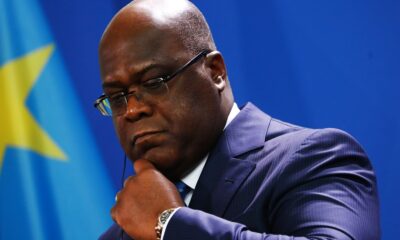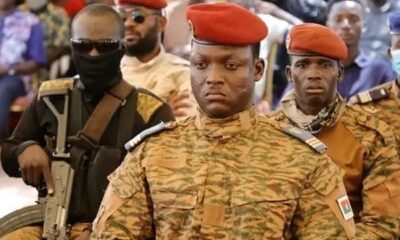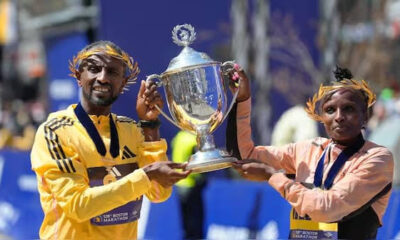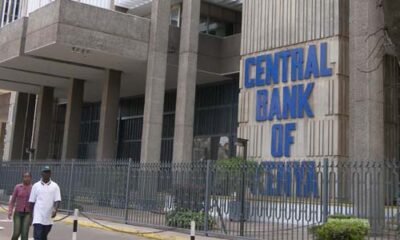Strictly Personal
Meeting Obasanjo, Tshisekedi at Congo battlefield by Festus Adebayo
Published
2 years agoon

Democratic Republic of Congo (DRC’s) Presidential Villa is a highly fortified palace. Like in many parts of Central Africa, the Congolese have turned their disadvantaged hilly and mountainous topography into aesthetic wonder. At every point in the expansive Villa, you confront menacing-looking, gun-toting soldiers who radio authorities before allowing you entry. White-painted effigies of four lions by the Villa gate compliment this menacing ambiance. The Villa itself is an old but well-maintained structure painted white and probably built in the 1970s. The language barrier limited the satisfaction of my curiosity as to whether Mobutu Sese-Seko ruled from this same Villa.
That perhaps is where the aesthetics end. Like Nigeria, DRC is in dire security straits. In features, both countries are twined like Siamese twins, as if from the same umbilical cord. While Nigeria is the most populous country in Africa, DRC has the largest land mass on the continent. With its 2,344,860 km square, compared to Nigeria’s 923,770 km square, Congo is more than twice of Nigeria’s land mass. It also has two time zones. Blessed with abundant mineral resources, since gaining independence, however – again same time in 1960 – both countries have been challenged by the scant supply of leadership. As a result, Nigeria and Congo are a caricature of Providence’s design for them as Eldorado. Since 1960, they have not been able to appropriate their humongous God-given resources.
As Nigeria suffocates under the apparently superior firepower of Boko Haram insurgents and bandits, DRC is muzzled by an armed militia group called the M23. While M23 operates in the eastern flank of the DRC, Nigerian terrorists’ domicile is in its Northern part. Between mid-June and July 2022, M23 summarily executed at least 29 civilians in Congo while in Nigeria, thousands of lives have been tethered by the bloodthirsty grove of terrorists.
In the midst of this tension, it was thus a pleasant surprise last Tuesday to see Nigeria’s military General and two-term president, Olusegun Obasanjo, at the DRC Presidential Villa. He was a guest of President Felix Tshisekedi.
Armed with a background of the unpleasant time the DRC seat of power was going through in the hands of rebels, Obasanjo’s presence raised some rebuttable conclusions that he had come as an amicus curia of sort of the Congolese government, in its time of tribulation. A top Congolese government source indeed confirmed to me that Obasanjo had been invited to help mediate the DRC crises with the M23.
Having been in Kinshasa on a different assignment, ferreting out what Obasanjo was about became my preoccupation. My reportorial instinct and logic, added to the quip from my source, made me agree that the august visitor had indeed come on that mission. Former UN Secretary-General, Ban Ki-Moon, had in November 2008 appointed Obasanjo as peace envoy to the DRC. Obasanjo’s task was to mediate a deal between regional antagonists like M23 and the government. Global apprehension had been on the upsurge that, if not urgently trapped, the tens of thousands of civilians who fled into camps as a result of violent activities of the militia might be in jeopardy. In that assignment, Obasanjo worked with the African Union to tease out a peace deal between the Congolese government and eastern Congo Tutsi rebels, as well as the Rwandan government, suspected to be their funder.
Also, Obasanjo, as current UN High Representative for the Horn of Africa, has been playing a huge mediative role in the ongoing Ethiopian crisis, a role assigned to him by the African Union (AU). A few weeks ago, specifically on August 4, the Ethiopian media reported that Obasanjo briefed the Peace and Security Council (PSC) on the Ethiopian crisis and what he had done after PSC’s last meeting. As High Representative, he had earlier briefed the AU during its 1064th session held in February. In June, Obasanjo had flown to Ethiopia to interact with Tigray’s Regional State President, Dr. Debretsion Gebremichael, and his Ethiopian counterpart, the country’s first female president, Sahle-Work Zewde.
M23 is a codename for the March 23 Movement or the Congolese Revolutionary Army. It is a rebel military group of mostly Tutsi ethnic groups that operates in the province of North Kivu. It was given birth on March 23, 2009. Since its founding, M23 has terrorized DRC. Between 2012 and 2013, its attacks led to the displacement of thousands of people. On November 20, 2012, it annexed Goma, the capital of the Province of North Kivu, with its over a million population. The rebels were however repelled a few weeks after by the Congolese army, fighting alongside UN troops and retook control of Goma. In its report on the crisis, the UN stated that Paul Kagame, whose Rwanda borders DRC, was the sole sponsor of the rebellion. M23 resumed its offensive in 2017 and, about two months ago, captured the DRC border town of Bunagana. Though Kagame withdrew his support for M23 after intense international pressure in 2012, he is alleged to have meandered back into sponsoring the rebels. Ugandan army commanders were also alleged by the UN to have reinforced the rebels with troops and weapons, as well as assisted them with recruiting soldiers.
On June 21, 2022, as the rebels fought Congolese forces in Ruvumu, a village in the eastern province, the M23 rebels allegedly summarily executed about 17 civilians, a figure that included two teenagers. It executed even more within a spate of two weeks. The guilt of the victims was that they allegedly acted as informants to the Congolese army about the rebels’ whereabouts. Some other civilians got shot dead as they fled, with others executed at close range. Both the M23 rebels and the Congolese army-backed UN troops fighting in North Kivu have been alleged to have deployed explosive weapons like mortar fire and artillery shelling in their fights, which most times hit civilians and civilian structures.
There is no government worth its onions that would not be bothered by the incursion of the M23 into its territory. President Tshisekedi surely is. Congo is the richest country in Africa. Those scary mountains of its are reputed to hide inside their bellies huge reserves of cobalt, gold, gems, copper, timber, and uranium. Its most valuable resource is its large reserve of diamonds. Indeed, the Congo has the world’s second-largest diamond reserves, at 150Mct, or 20.5% of the global total. Substantial diamond reserves can be found in Kasai Occidental and Kasai Oriental.
At about 10a.m, he was ushered into the expansive and chic waiting room of President Tshisekedi by one of the Congolese president’s envoys, Pacifique KashashaBirinda. A few minutes after, he was led to the office of Tshisekedi, with press photographers alone allowed to take shots of their immediate convivial exchanges. Thereafter, the press was asked to excuse them. After about two hours of talks, Obasanjo and Pacifique came out to address a battery of Congolese and Nigerian journalists waiting for them.
Obasanjo and Tshisekedi met for about two hours. Immediately Obasanjo came out of the meeting to address the press, my question to him was why he was in Congo and what he and Tshisekedi discussed. Chaperoned by Pacifique, who also acted as his interpreter, the old warhorse however filibustered of sort as his response was omnibus. He brushed it off in diplomatese.
As the International Institute of Tropical Agriculture, (IITA) Ambassador, Obasanjo, on his way to the airport to fly back to Lagos, visited the institute’s expansive acres of citrus and cassava farm located on the outskirts of Kinshasa. Asked again why he had come to DRC, he said, among others, that he came to congratulate Tshisekedi as the newly appointed Chairman of SADC.
Obasanjo further espoused how agricultural security, through agribusiness, can bring food to the table in Africa and how the misbehavior on the part of the youths is due to a lack of employment. One sector that can provide this security, he said, is agribusiness. He lauded IITA and its DRC-born Director General, Dr. NterenyaSanginga, for the institute’s contributions to food security in Africa and said that from what he had seen, especially in IITA-pioneered cassava farming, he would copy it in his farm in Nigeria. He said that the ongoing war in Ukraine exposed a huge gap in Africa’s agriculture, revealing that Africa depends on Ukraine and Russia for a great chunk of its wheat consumption. However, according to him, he was gladdened when, on a recent visit to Ethiopia, he was told that the country, in the next two years, would not only be self-sufficient in wheat production but would be a net importer of wheat.
The day before this, in the evening of Obasanjo’s second day in the DRC, President Tshisekedi had hosted him and his entourage to a sumptuous dinner beside his presidential palace overlooking River Congo. On the other side of the river, about a few kilometers, was Congo Brazzaville; the river being nature’s own way of bifurcating the two different nations. As we all waited for Tshisekedi, he appeared in a dark brown flown shirt, brown trousers, and black slippers at exactly 6.02 pm. A Congolese band was on standby to scintillate the audience. Obasanjo moved his body in consonance with the beat on the high table where he sat. At some point, Obasanjo and Tshisekedi again walked backstage and engaged each other in another round of mutual tete-a-tete for about 30 minutes.
A man many love to loathe, students of theology must be studying what the spiritual balm that makes OlusegunObasanjo tick is. As he landed in Lagos on Wednesday, right from the Presidential Wing of the Murtala Muhammed Airport, Obasanjo was reported to have again jetted to London. It was only the second day that pictures of him and Nigerian politicians in another round of rapprochement surfaced in the media. The curious question to ask is why the world is inviting the old warhorse to mediate in their crises but Obasanjo’s peacemaking talent is pining away in the Nigerian backyard. Or, are those inviting Obasanjo foolish and Nigerian current leaders, wisdom personified?
You may like
-


Air Peace, capitalism and national interest, By Dakuku Peterside
-


This is chaos, not governance, and we must stop it, By Tee Ngugi
-


Off we go again with public shows, humbug and clowning, By Jenerali Uliwengu
-


How patriarchy underpins gender violence today, By Tee Ngugi
-


Help! There’s a dangerous, secret plot to save the EAC from imminent death, By Charles Onyango-Obbo
-


How South Africa, US elections could shape Tshisekedi’s bread in Kinshasa, By Charles Onyango-Obbo
Strictly Personal
Air Peace, capitalism and national interest, By Dakuku Peterside
Published
3 days agoon
April 16, 2024
Nigerian corporate influence and that of the West continue to collide. The rationale is straightforward: whereas corporate activity in Europe and America is part of their larger local and foreign policy engagement, privately owned enterprises in Nigeria or commercial interests are not part of Nigeria’s foreign policy ecosystem, neither is there a strong culture of government support for privately owned enterprises’ expansion locally and internationally.
The relationship between Nigerian businesses and foreign policy is important to the national interest. When backing domestic Nigerian companies to compete on a worldwide scale, the government should see it as a lever to drive foreign policy, and national strategic interest, promote trade, enhance national security considerations, and minimize distortion in the domestic market as the foreign airlines were doing, boost GDP, create employment opportunities, and optimize corporate returns for the firms.
Admitted nations do not always interfere directly in their companies’ business and commercial dealings, and there are always exceptions. I can cite two areas of exception: military sales by companies because of their strategic implications and are, therefore, part of foreign and diplomatic policy and processes. The second is where the products or routes of a company have implications for foreign policy. Air Peace falls into the second category in the Lagos – London route.
Two events demonstrate an emerging trend that, if not checked, will disincentivize Nigerian firms from competing in the global marketplace. There are other notable examples, but I am using these two examples because they are very recent and ongoing, and they are typological representations of the need for Nigerian government backing and support for local companies that are playing in a very competitive international market dominated by big foreign companies whose governments are using all forms of foreign policies and diplomacy to support and sustain.
The first is Air Peace. It is the only Nigerian-owned aviation company playing globally and checkmating the dominance of foreign airlines. The most recent advance is the commencement of flights on the Lagos – London route. In Nigeria, foreign airlines are well-established and accustomed to a lack of rivalry, yet a free-market economy depends on the existence of competition. Nigeria has significantly larger airline profits per passenger than other comparable African nations. Insufficient competition has resulted in high ticket costs and poor service quality. It is precisely this jinx that Air Peace is attempting to break.
On March 30, 2024, Air Peace reciprocated the lopsided Bilateral Air Service Agreement, BASA, between Nigeria and the United Kingdom when the local airline began direct flight operations from Lagos to Gatwick Airport in London. This elicited several reactions from foreign airlines backed by their various sovereigns because of their strategic interest. A critical response is the commencement of a price war. Before the Air Peace entry, the price of international flight tickets on the Lagos-London route had soared to as much as N3.5 million for the economy ticket. However, after Air Peace introduced a return economy class ticket priced at N1.2 million, foreign carriers like British Airways, Virgin Atlantic, and Qatar Airways reduced their fares significantly to remain competitive.
In a price war, there is little the government can do. In an open-market competitive situation such as this, our government must not act in a manner that suggests it is antagonistic to foreign players and competitors. There must be an appearance of a level playing field. However, government owes Air Peace protection against foreign competitors backed by their home governments. This is in the overall interest of the Nigerian consumer of goods and services. Competition history in the airspace works where the Consumer Protection Authority in the host country is active. This is almost absent in Nigeria and it is a reason why foreign airlines have been arbitrary in pricing their tickets. Nigerian consumers are often at the mercy of these foreign firms who lack any vista of patriotism and are more inclined to protect the national interest of their governments and countries.
It would not be too much to expect Nigerian companies playing globally to benefit from the protection of the Nigerian government to limit influence peddling by foreign-owned companies. The success of Air Peace should enable a more competitive and sustainable market, allowing domestic players to grow their network and propel Nigeria to the forefront of international aviation.
The second is Proforce, a Nigerian-owned military hardware manufacturing firm active in Rwanda, Chad, Mali, Ghana, Niger, Burkina Faso, and South Sudan. Despite the growing capacity of Proforce in military hardware manufacturing, Nigeria entered two lopsided arrangements with two UAE firms to supply military equipment worth billions of dollars , respectively. Both deals are backed by the UAE government but executed by UAE firms.
These deals on a more extensive web are not unconnected with UAE’s national strategic interest. In pursuit of its strategic national interest, India is pushing Indian firms to supply military equipment to Nigeria. The Nigerian defence equipment market has seen weaker indigenous competitors driven out due to the combination of local manufacturers’ lack of competitive capacity and government patronage of Asian, European, and US firms in the defence equipment manufacturing sector. This is a misnomer and needs to be corrected.
Not only should our government be the primary customer of this firm if its products meet international standards, but it should also support and protect it from the harsh competitive realities of a challenging but strategic market directly linked to our national military procurement ecosystem. The ability to produce military hardware locally is significant to our defence strategy.
This firm and similar companies playing in this strategic defence area must be considered strategic and have a considerable place in Nigeria’s foreign policy calculations. Protecting Nigeria’s interests is the primary reason for our engagement in global diplomacy. The government must deliberately balance national interest with capacity and competence in military hardware purchases. It will not be too much to ask these foreign firms to partner with local companies so we can embed the technology transfer advantages.
Our government must create an environment that enables our local companies to compete globally and ply their trades in various countries. It should be part of the government’s overall economic, strategic growth agenda to identify areas or sectors in which Nigerian companies have a competitive advantage, especially in the sub-region and across Africa and support the companies in these sectors to advance and grow to dominate in the African region with a view to competing globally. Government support in the form of incentives such as competitive grants ,tax credit for consumers ,low-interest capital, patronage, G2G business, operational support, and diplomatic lobbying, amongst others, will alter the competitive landscape. Governments and key government agencies in the west retain the services of lobbying firms in pursuit of its strategic interest.
Nigerian firms’ competitiveness on a global scale can only be enhanced by the support of the Nigerian government. Foreign policy interests should be a key driver of Nigerian trade agreements. How does the Nigerian government support private companies to grow and compete globally? Is it intentionally mapping out growth areas and creating opportunities for Nigerian firms to maximize their potential? Is the government at the domestic level removing bottlenecks and impediments to private company growth, allowing a level playing field for these companies to compete with international companies?
Why is the government patronising foreign firms against local firms if their products are of similar value? Why are Nigerian consumers left to the hands of international companies in some sectors without the government actively supporting the growth of local firms to compete in those sectors? These questions merit honest answers. Nigerian national interest must be the driving factor for our foreign policies, which must cover the private sector, just as is the case with most developed countries. The new global capitalism is not a product of accident or chance; the government has choreographed and shaped it by using foreign policies to support and protect local firms competing globally. Nigeria must learn to do the same to build a strong economy with more jobs.
Strictly Personal
This is chaos, not governance, and we must stop it, By Tee Ngugi
Published
1 week agoon
April 10, 2024
The following are stories that have dominated mainstream media in recent times. Fake fertiliser and attempts by powerful politicians to kill the story. A nation of bribes, government ministries and corporations where the vice is so routine that it has the semblance of policy. Irregular spending of billions in Nairobi County.
Billions are spent in all countries on domestic and foreign travel. Grabbing of land belonging to state corporations, was a scam reminiscent of the Kanu era when even public toilets would be grabbed. Crisis in the health and education sectors.
Tribalism in hiring for state jobs. Return of construction in riparian lands and natural waterways. Relocation of major businesses because of high cost of power and heavy taxation. A tax regime that is so punitive, it squeezes life out of small businesses. Etc, ad nauseam.
To be fair, these stories of thievery, mismanagement, negligence, incompetence and greed have been present in all administrations since independence.
However, instead of the cynically-named “mama mboga” government reversing this gradual slide towards state failure, it is fuelling it.
Alternately, it’s campaigning for 2027 or gallivanting all over the world, evoking the legend of Emperor Nero playing the violin as Rome burned.
A government is run based on strict adherence to policies and laws. It appoints the most competent personnel, irrespective of tribe, to run efficient departments which have clear-cut goals.
It aligns education to its national vision. Its strategies to achieve food security should be driven by the best brains and guided by innovative policies. It enacts policies that attract investment and incentivize building of businesses. It treats any kind of thievery or negligence as sabotage.
Government is not a political party. Government officials should have nothing to do with political party matters. They should be so engaged in their government duties that they literally would not have time for party issues. Government jobs should not be used to reward girlfriends and cronies.
Government is exhausting work undertaken because of a passion to transform lives, not for the trappings of power. Government is not endless campaigning to win the next election. To his credit, Mwai Kibaki left party matters alone until he had to run for re-election.
We have corrupted the meaning of government. We have parliamentarians beholden to their tribes, not to ideas.
We have incompetent and corrupt judges. We have a civil service where you bribe to be served. Police take bribes to allow death traps on our roads. We have urban planners who plan nothing except how to line their pockets. We have regulatory agencies that regulate nothing, including the intake of their fat stomachs.
We have advisers who advise on which tenders should go to whom. There is no central organising ethos at the heart of government. There is no sense of national purpose. We have flurries of national activities, policies, legislation, appointments which don’t lead to meaningful growth. We just run on the same spot.
Tee Ngugi is a Nairobi-based political commentator
EDITOR’S PICK


‘Reconsider your anti-people policies, they are causing hardship, insecurity in Nigeria’— PDP tells Tinubu
Nigeria’s main opposition party, the Peoples Democratic Party (PDP), has called on President Bola Tinubu to consider what it calls...


Top European, Asian clubs on alert as Super Eagles keeper set to make contract decision
Some top clubs in Europe and Asia have been put on alert as Super Eagles and Chippa United goalkeeper, Stanley...


IMF says South Africa needs to do more to cut spending, lower debt-to-GDP ratio
A top official from the International Monetary Fund has revealed that South Africa needs to do more to cut spending...


Burkina Faso expels 3 French diplomats over ‘subversive activities’
According to a letter quoted by Reuters on Thursday, three French diplomats have been sent back to France by Burkina...


Nigeria’s MAX partners Ghana’s Kofa in e-bike financing deal
Nigeria’s electric vehicle solutions provider, MAX, has announced striking a partnership deal with Ghana’s innovator in energy networks, Kofa, that...


Zambia asks EU to help strengthen its democratic initiatives ahead of 2026 elections
The Zambian government has called on the European Union (EU) to help in strengthening democratic initiatives in the country as...


Nigeria destined to become major global economy under Tinubu— VP Shettima
Nigeria’s Vice President, Kashim Shettima, has predicted that the country is destined to become a major economic force in the...


Nigeria’s central bank insists depleting external reserves not due to Naira defence
According to the Central Bank of Nigeria (CBN), the big drop in the country’s foreign exchange reserves was not due...


African Guarantee Fund partners Nordic Development Fund to launch green finance in Nigeria
The African Guarantee Fund (AGF) has teamed up with the Nordic Development Fund (NDF) to launch a green finance fund...


Ethiopia’s Lemma, Kenya’s Obiri give Africa double podium finish at Boston Marathon
Ethiopia’s long distance runner, Sisay Lemma, and Kenyan female marathon sensation, Hellen Obiri, teamed up to give Africa a double...
Trending
-

 Sports2 days ago
Sports2 days agoEthiopia’s Lemma, Kenya’s Obiri give Africa double podium finish at Boston Marathon
-

 Metro2 days ago
Metro2 days agoZambia: Many feared injured as UPND, PF supporters clash in court
-

 Culture2 days ago
Culture2 days agoDavido’s ‘Unavailable’ achieves milestone with 100 million views on YouTube, Spotify
-

 VenturesNow2 days ago
VenturesNow2 days agoInvestors’ wealth drops by $968 million on Nairobi Securities Exchange


